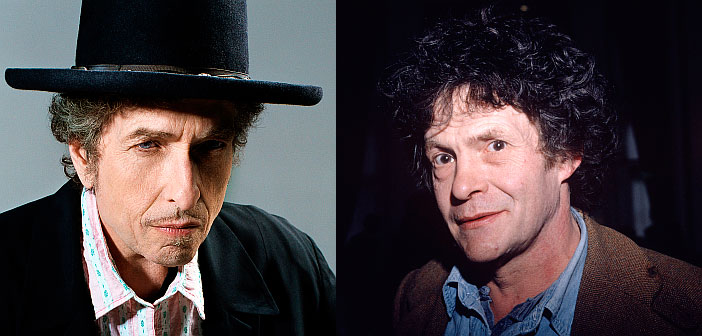Heathcote Williams doesn’t join the mountain of praise heaped on Bob Dylan for winning the Nobel Prize for Literature.
Source: ArtsJournal.com
The title of Heathcote Williams’s memoir, Of Dylan Thomas and his Deaths, reflects the author’s belief that the great Welsh poet died twice, not once. He writes, “It can be said that he was to suffer no less than two deaths at American hands.”The first death, contrary to the accepted claim that he died of a drinking bout, refers to his “mistreatment with morphine by an incompetent and flamboyant doctor” in New York, who misdiagnosed his condition and “brought on the coma from which he would never recover.”
The second death came in the form of cultural theft when a famous imposter — namely Bob Dylan — stole his identity by exploiting his name, then denied it, and lied about it. “Less than a decade after his death,” Williams writes, the poet’s identity “was eerily pilfered so that the Dylan Thomas that everyone had come to know, and love pre-1953 would be eclipsed by his name being borrowed or, more properly, stolen.”
Williams is thoroughly familiar with the ways of show business, having been both a film actor and screenwriter. “[O]bviously anyone in the world of entertainment is at liberty to call themselves whatever they wish,” he writes. “Penny Rimbaud of Crass and the Shakespeares Sister, for example, have hardly dented the significance of either the French poet or of the English bard. But Bob Dylan’s case is perhaps different, if only because helping himself to Dylan’s name and to something of his cachet has clearly sat so uneasily with the thief himself over the subsequent decades.”
There are plenty of meaty reasons for Williams’s contempt for the world-famous performer. He quotes Joni Mitchell, who put it this way: “Bob is not authentic at all. He’s a plagiarist, and his name and voice are fake. Everything about Bob is a deception. We are like night and day, he and I.” Folksinger Tim Hardin was even more succinct. Williams writes that “Bob Dylan’s unrestrained kleptomania” would prompt Hardin to say: “He’s a cold motherfucker, man.”
Williams also cites Paul Simon’s satirical jibe in the song “A Simple Desultory Phillippic …”: “I knew a man, his brain so small / He couldn’t think of nothing at all / He’s not the same as you and me / He doesn’t dig poetry. He’s so unhip that / When you say Dylan, he thinks you’re talking about Dylan Thomas / Whoever he was / The man ain’t got no culture / But it’s alright, ma / Everybody must get stoned.”
But the meatiest reason involves a larger issue than the “elements of Bob Dylan’s character that would make Dylan Thomas, were he alive, squirm with righteous revulsion.” It is precisely this: “Unlike Dylan Thomas who never once sold out — who never ‘shilled’ for anyone — his deadly Doppelganger would prove as keen as mustard to have his voice serve any and every American corporation.”
Williams writes that when Bob Dylan “happily does what Dylan Thomas never did, and that is to sell out to any and every commercial outfit and does so on an industrial scale, it is perhaps tempting to recall Norman Mailer’s harsh verdict on him: ‘If [Bob] Dylan’s a poet, I’m a basketball player.” Williams adds:
Dylan Thomas once said wistfully but cheerfully that he’d never earned enough from poetry “to feed a goldfinch,” and he hadn’t. He left just under a hundred pounds upon his death. The fake Dylan has been voraciously, all-consumingly commercial.
Bob Dylan would sing “I Want You” for a commercial for Chobani yogurt; he would sing “Love Sick” for a lingerie company, Victoria’s Secret; he’d appear in an ad for the Cadillac Escalade and he’d be shown driving Cadillac’s gas-guzzling sport utility vehicle as he strums, and he’d sing what had been, once upon a time, his generational protest song, “Times They Are A’Changin’” whilst the advertising company that had hired him projected seductive images designed to convey the virtues of the Bank of Montreal.
In a “Super Bowl Sunday” TV ad seen by more than 100 million American viewers Bob Dylan rattled an extraordinary concoction of jingoistic rhetoric to promote Chrysler, a company noted for building the M1 Abrams tanks that were used during the Vietnam War. “So let Germany brew your beer,” he tells the world. “Let Switzerland make your watch. Let Asia assemble your phone. We will build your car.” With stunningly meaningless gravitas, he concludes: “Is there anything more American than America?”
Or more shameless than His Bobness?
Bob Dylan was awarded the Nobel Prize for Literature on 13 October 2016. Heathcote Williams’ latest book is Brexit Boris: From Mayor to Nightmare and the next performance of his theatrical series Poetry Can F*ck Off is at London’s Cockpit Theatre on Sunday 23 October: details here…

